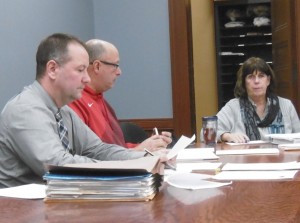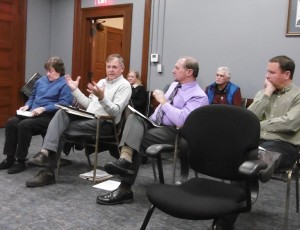WESTFIELD – Monday, the Legislative & Ordinance Committee unanimously approved a smoking ban on all city owned, operated or leased outdoor city properties to go before the City Council on Thursday for a vote. The matter was sent back to committee due to an error on the agenda at the last City Council meeting.
The ordinance began with a request from the Senior Center board to ban smoking on its property. During the discussion, Council on Aging director Tina Gorman said her concern was what would happen to the Senior Center request if the council votes down the ban, which she thought was possible following the discussion at the last meeting.
Gorman said the Council on Aging is essentially a social service organization.
“We’re not a social club. We’re there to provide services and programs,” she said, adding that a lot of her clientele are physically compromised, and should be able to walk into a healthy environment.
Gorman also added that the Council on Aging receives many grants from organizations whose mission is to promote health for senior citizens.
“My biggest concern for this committee is if the Council decides not to go with a total city ban, I don’t want the Senior Center to get lost in the shuffle,” Gorman said.
L&O Chair Ralph J. Figy assured Gorman that if the city-wide ordinance is voted down, he would propose a separate ban for the Council on Aging property.

Legislative & Ordinance Committee members William Onyski, Ralph J. Figy and Mary O’Connell. (Photo by Amy Porter)
“I do see the Senior Center as a distinct and different entity as city-wide property,” said At-large Councilor Cindy C. Harris, who was present at the meeting. She added it would be difficult for several of the councilors to implement a city-wide ban.
“My feeling is at the state level, they outlawed smoking on all school properties,” Figy said, adding that he was looking for efficiency and consistency across the city.
L&O member and Ward 4 Councilor Mary O’Connell noted that streets and sidewalks are not included in the ordinance.
At-large Councilor Dan Allie asked if city parks would be included in the ban, which was answered in the affirmative. “It is still a legal product. There is the law of unintended consequences,” Allie said.
The L&O Committee also voted 3-0 to support a change in title of office to a combined Treasurer/Collector. Previously, the positions were separate, although Mayor Brian P. Sullivan, who attended the meeting, said that the positions were combined going back sixteen years or so.
Sullivan added that Meghan Kane has been serving as the treasurer and acting collector for the past year. He said there is an economic benefit of going from two department heads to one, but that was not the only consideration.
“We may see some savings, but it makes a whole lot more sense to have one person in charge of both,” Sullivan said.
Kane added that the majority of cities and towns in the Commonwealth have combined treasurers and collectors.
Kept in committee following a long discussion on Monday was the Complete Streets ordinance. In introducing it, Figy said it is more of a philosophical idea of planning streets in the future to accommodate all different modes of transportation, including bicycles and pedestrians.
Figy said the ordinance they drafted gives the mayor control to determine whether a plan meets the Complete Streets requirements, and that city departments and the DPW will be able to use their best judgment for milling and repaving and other minor maintenance projects. He also said the mayor has the ability to exclude a project. He said the Traffic Commission, Board of Public Works and Planning Board will manage projects, and the L&O will only be an approving board.
The concerns raised in the discussion centered over how much control the state would have over city planning if they adopt Complete Streets.
“Why are we going down a road to commit ourselves,” asked O’Connell.
“I have some reservations with the whole idea. Philosophically, I think it’s a great idea. I think we already do this,” Figy said, referring to city engineer Mark Cressotti’s department. He said he was leery of the offer of $200,000 from the state for projects, due to its penchant towards unfunded mandates.
“I don’t think it’s worth spending $500,000 to get $200,000,” said L&O member and Ward 6 Councilor William Onyski.
Cressotti said that once the Complete Streets is adopted, there is a $50,000 grant available from the state to prepare a list of projects for it. Once the city applies for a project, there is a pot of up to $400,000 for that project.
Ward 1 Councilor Mary Ann Babinski questioned the mindset that the ordinance would lock the city into something. “I don’t see it that way. You have access to money for projects,” she said. The Complete Streets ordinance had previously spent several weeks in the Public Health & Safety committee chaired by Allie and on which Babinski and Onyski serve.
“We do this anyway. This is good for urban development. By not passing the ordinance, we are forgoing money. But, we’re still going to do this as appropriate,” said Cressotti. He added that the funds represent one-third of the city’s annual Chapter 90 allotment. “We don’t get enough Chapter 90. This is their answer. If we say no to this, how can we ask for more Chapter 90?” he added.
Allie said the Public Health & Safety Committee had made several changes to the ordinance, including rejecting board representation, the notion that costs alone shall not be considered, and that all projects be considered for Complete Streets.
Figy said he would like to take those three recommendations into consideration, and made a motion to hold the matter for another meeting, which was approved.


